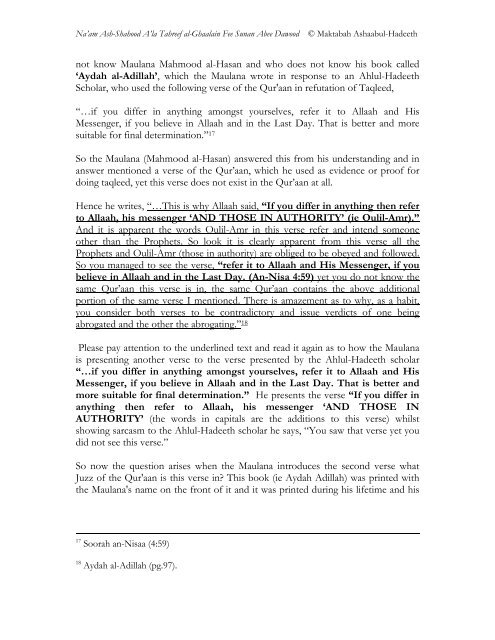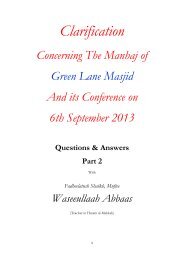na'am as-shahood a'la tahreef al - Ahlul hadeeth
na'am as-shahood a'la tahreef al - Ahlul hadeeth
na'am as-shahood a'la tahreef al - Ahlul hadeeth
You also want an ePaper? Increase the reach of your titles
YUMPU automatically turns print PDFs into web optimized ePapers that Google loves.
Na’am Ash-Shahood A’la Tahreef <strong>al</strong>-Gha<strong>al</strong>ain Fee Sunan Abee Dawood © Maktabah Ashaabul-Hadeeth<br />
not know Maulana Mahmood <strong>al</strong>-H<strong>as</strong>an and who does not know his book c<strong>al</strong>led<br />
‘Aydah <strong>al</strong>-Adillah’, which the Maulana wrote in response to an <strong>Ahlul</strong>-Hadeeth<br />
Scholar, who used the following verse of the Qur'aan in refutation of Taqleed,<br />
“…if you differ in anything amongst yourselves, refer it to Allaah and His<br />
Messenger, if you believe in Allaah and in the L<strong>as</strong>t Day. That is better and more<br />
suitable for fin<strong>al</strong> determination.” 17<br />
So the Maulana (Mahmood <strong>al</strong>-H<strong>as</strong>an) answered this from his understanding and in<br />
answer mentioned a verse of the Qur’aan, which he used <strong>as</strong> evidence or proof for<br />
doing taqleed, yet this verse does not exist in the Qur’aan at <strong>al</strong>l.<br />
Hence he writes, “…This is why Allaah said, “If you differ in anything then refer<br />
to Allaah, his messenger ‘AND THOSE IN AUTHORITY’ (ie Oulil-Amr).”<br />
And it is apparent the words Oulil-Amr in this verse refer and intend someone<br />
other than the Prophets. So look it is clearly apparent from this verse <strong>al</strong>l the<br />
Prophets and Oulil-Amr (those in authority) are obliged to be obeyed and followed.<br />
So you managed to see the verse, “refer it to Allaah and His Messenger, if you<br />
believe in Allaah and in the L<strong>as</strong>t Day. (An-Nisa 4:59) yet you do not know the<br />
same Qur’aan this verse is in, the same Qur’aan contains the above addition<strong>al</strong><br />
portion of the same verse I mentioned. There is amazement <strong>as</strong> to why, <strong>as</strong> a habit,<br />
you consider both verses to be contradictory and issue verdicts of one being<br />
abrogated and the other the abrogating.” 18<br />
Ple<strong>as</strong>e pay attention to the underlined text and read it again <strong>as</strong> to how the Maulana<br />
is presenting another verse to the verse presented by the <strong>Ahlul</strong>-Hadeeth scholar<br />
“…if you differ in anything amongst yourselves, refer it to Allaah and His<br />
Messenger, if you believe in Allaah and in the L<strong>as</strong>t Day. That is better and<br />
more suitable for fin<strong>al</strong> determination.” He presents the verse “If you differ in<br />
anything then refer to Allaah, his messenger ‘AND THOSE IN<br />
AUTHORITY’ (the words in capit<strong>al</strong>s are the additions to this verse) whilst<br />
showing sarc<strong>as</strong>m to the <strong>Ahlul</strong>-Hadeeth scholar he says, “You saw that verse yet you<br />
did not see this verse.”<br />
So now the question arises when the Maulana introduces the second verse what<br />
Juzz of the Qur'aan is this verse in? This book (ie Aydah Adillah) w<strong>as</strong> printed with<br />
the Maulana's name on the front of it and it w<strong>as</strong> printed during his lifetime and his<br />
17 Soorah an-Nisaa (4:59)<br />
18 Aydah <strong>al</strong>-Adillah (pg.97).



